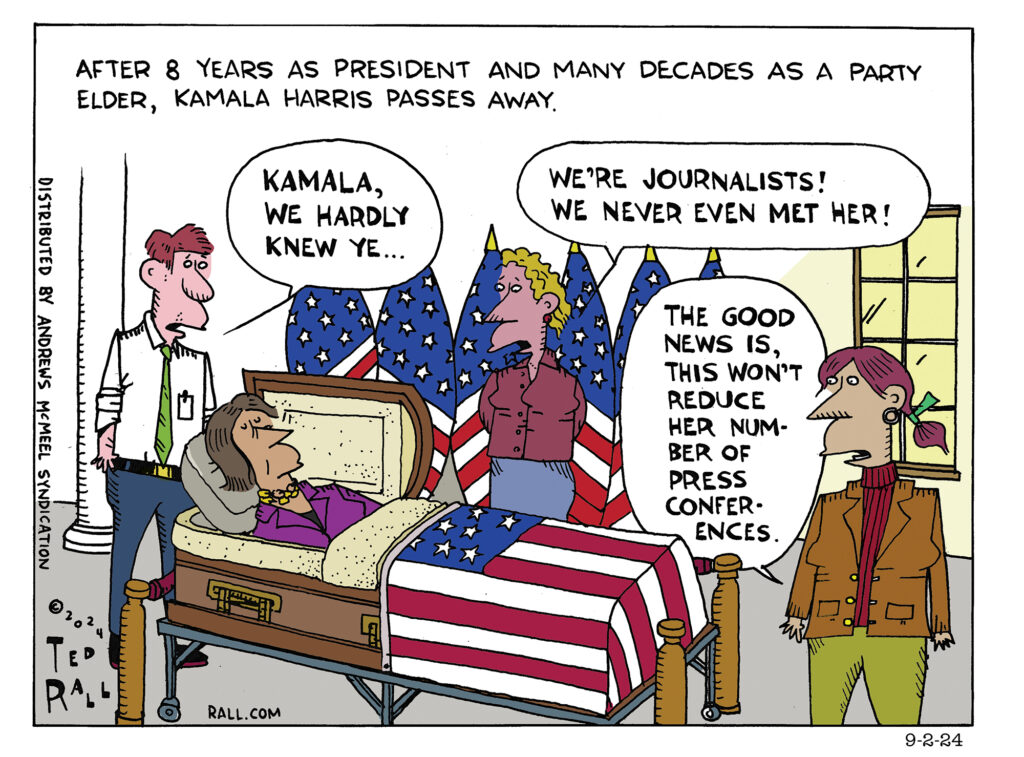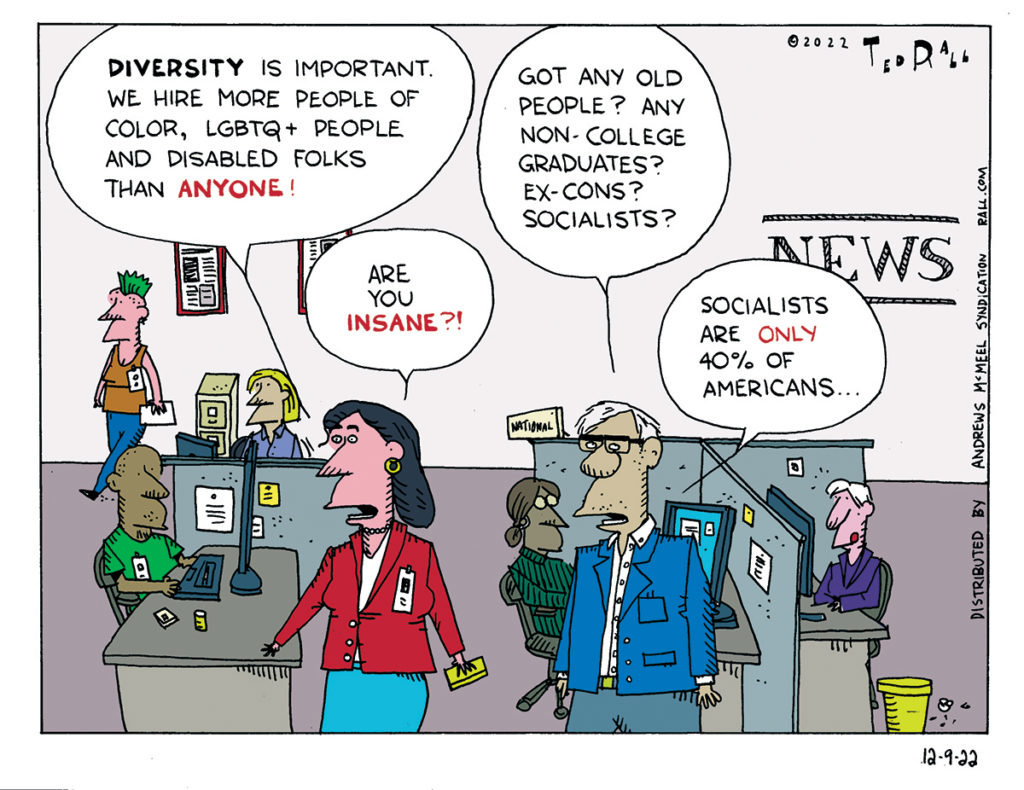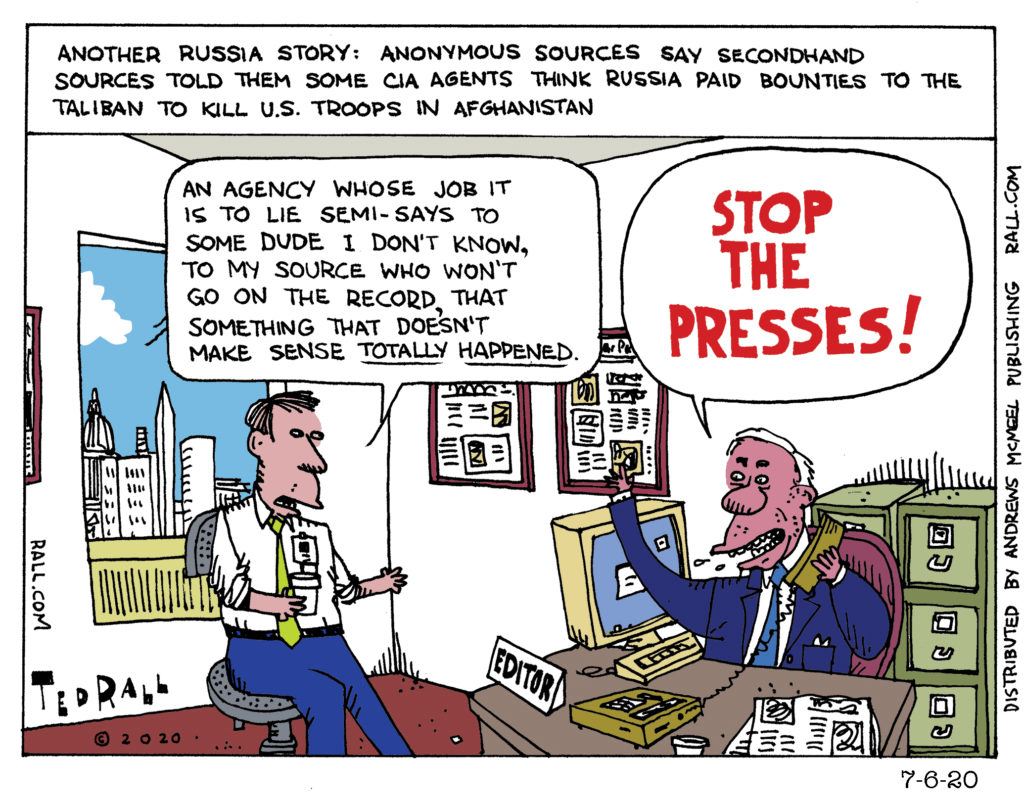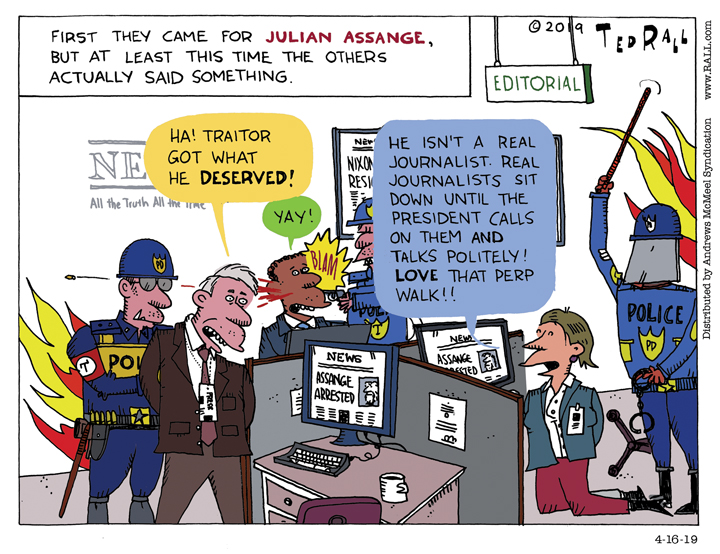Echoing Biden, Kamala Harris seems determined to go as long as possible into the general election without holding a press conference or granting a real interview to a journalist willing to challenge her deflecting answers to questions. Can she, like Biden, make it all the way through the presidency without any substantial interaction with the press?
Either the President Is a Terrorist or a Journalist Is a Fraud. Why Doesn’t Anyone Want To Find Out Which Is True?

Corporate ownership of media outlets and consolidation have deteriorated the quality of reporting in numerous ways: accelerating access journalism, gutting local news and investigative reporting, a decreasing willingness to take chances or to invest in projects without a quick return on investment.
Now there’s a new problem, one so baked into the equation that we should have seen this coming all along: newspapers and other media organizations acquired by corporations are themselves acting like corporations.
For an earlier generation of journalists, ignoring a major news event after it broke at another outlet was out of the question. The movies “All the President’s Men” and “The Post” depict the rivalry between the New York Times and the Washington Post as they crosschecked one another’s scoops on Watergate and the Pentagon Papers, and built on one another’s reporting. Despite pressure to the contrary from their friends at the highest levels of the political and financial establishment, publishers Arthur Sulzberger and Meg Greenfield set aside their usual caution and helped bring down President Nixon. They worried about repercussions but the news always came first.
This culture didn’t always play out to the benefit of journalism’s ostensible endless quest for truth. Reporter Gary Webb, who broke much of the 1980s Iran-Contra scandal in the pages of the San Jose Mercury News, was attacked by major competitors who nitpicked his writing to death in a “tawdry” campaign to discredit him over minor errors, by the Post, Times and the Los Angeles Times. Webb was basically right—but they destroyed him and his career, pushing him to commit suicide.
In the aggregate, however, reporters’ drive to learn more and do better served readers well.
Unlike a news organization, in which uncovering the truth whatever it may be is the prime directive, a corporation’s mission is first and foremost to maximize profits to shareholders. So corporate news organizations put revenue first as well. Reporting has been pushed down the list.
Most major news organizations are owned by people and parent companies with far-ranging interests that conflict with news gathering. The formerly family-run Post is now owned by Jeff Bezos, whose Amazon cloud business has billions in secret contracts with the NSA and CIA; would he let his pet newspaper mess up his cozy relationship with the White House and the deep state by kneecapping the president?
Bezos’ massive conflicts of interest may not be the sole reason the Post hasn’t touched a blockbuster story: Seymour Hersh’s allegation that President Joe Biden personally ordered one of the biggest acts of state terrorism in modern history, the bombing of the Nord Stream 2 natural-gas pipeline. But it’s a safe bet they are a contributing factor.
Under normal circumstances, or more accurately the circumstances that prevailed in the previous century, a detailed allegation written by the legendary Pulitzer-winning reporter who exposed the My Lai massacre and the Abu Ghraib prison abuse scandal, that a sitting president risked World War III and allowed Europeans to freeze—not to mention deliberately created a massive environmental disaster—would be a bombshell no reputable news outlet could ignore—indeed, they’d run with it, try to verify it, build upon it, comment upon it. Instead, there has been a near 100% U.S. media blackout. If it wasn’t so Orwellian you’d have to be impressed by how thorough and disciplined the effort to quash Hersh in a vacuum of obscurity has been.
I’ve been running Google News searches on Hersh and Nord Stream every day since the story broke about a week ago. No big-name U.S. newspaper, radio network or cable news channel has mentioned it, not even to say it’s false.
None.
Unless you are a news geek of epic proportions it’s unlikely that you would have noticed one of the few mentions in right-wing sources like the Murdoch-owned New York Post, the Washington Times and Fox’s Tucker Carlson, which can’t resist anything that bags on the president, or a blog like New Left Review, UnHerd and Firstpost. Times, Post, NPR, CBS—nada.
It’s entirely possible that Hersh is partly or totally wrong about how the pipeline was bombed and who was responsible. What arouses suspicion that he’s right is the militant incuriosity of the press. You can’t even find an op-ed speculating on who might have done the deed.
The West initially and hilariously blamed Russia, which co-owns the pipeline, for blowing up its own multibillion dollar property. That story quickly fell apart.
So who did it? You’d think some enterprising reporter would try to find out—but you’d be wrong. Hersh’s story relies on a single anonymous source. But at least he’s got a source and a willingness to quote them. That’s more than anyone else. Meanwhile the Biden Administration has not categorically denied involvement—Washington-speak for we 100% didn’t do it. Back in the not-so-old days, that would make many an ink-stained wretch’s ear perk up.
I’m with my former colleague Mark Ames: “If anyone has a more convincing story then come out with it, show us the goods,” he says.
No matter the outcome, a reporter who proved what really happened a few hundred feet under the North Sea would score a delicious scalp: Biden’s or Hersh’s. Either the president is a war criminal who should be arrested immediately or a gadfly journalist has become a lying hack to whom no one should pay attention. Which is it? No one in American corporate media seems to want to nail this generation’s Nixon….or Gary Webb.
Why not?
A free press has the right to print or not print anything as it pleases. But the decision of thousands of editors and producers not to touch Hersh’s pipeline story doesn’t feel like a coincidence or such an easy call as to be unanimous. It feels like a hard chill.
Media critic Robert Wright thinks the self-imposed blackout remains in force because the (sorry) explosive truth might undermine U.S. political, corporate and media support for Ukraine: “Not even using the Hersh story as an occasion to revisit the question of who blew up the pipeline (which they could have done even while treating the Hersh story skeptically)—are more evidence of how committed much of the elite media now is to serving the official American narrative [on the Ukraine war],” says Wright.
It’s also a reflection of corporate ownership of the media. When a corporation faces bad or inconvenient news it refuses to comment, counting on the American people’s infinite vulnerability to the distraction machine.
(Ted Rall (Twitter: @tedrall), the political cartoonist, columnist and graphic novelist, co-hosts the left-vs-right DMZ America podcast with fellow cartoonist Scott Stantis. You can support Ted’s hard-hitting political cartoons and columns and see his work first by sponsoring his work on Patreon.)
Trump and Biden are Both Liars. Only Trump Gets Called Out.

The following phrase, and its variants, has become ubiquitous: “Donald Trump’s baseless charges of election fraud.” Mainstream news outlets have accelerated its use during the congressional hearings on the January 6th Capitol riot.
The phrase is accurate. Though historically American elections have been marred by fraud and outright subversion, no evidence has surfaced to suggest that any such improprieties occurred during the 2020 presidential election that were substantial enough to change the result. As far as we know, Joe Biden was legitimately elected.
But is it journalistically kosher?
Fairness, accuracy and integrity are the core of journalistic ethics. Those values are compromised when they are applied inconsistently, as do American news companies.
Republicans, conservatives and supporters of former President Donald Trump in particular have long complained that corporate media outlets have been harder on him than on other politicians or previous presidents. It’s hard to disagree. Journalists’ labeling of Trump’s allegations that the 2020 election was stolen as a lie is a case in point; it’s impossible to think of another American politician who has been so repeatedly editorialized against in non-opinion news stories or to have his claims — no matter how untrue — repeatedly denied in headlines.
Biden and fellow Democrats, for example, have taken to calling high gas prices “Putin’s gas hike.” This is just as false as Trump’s election BS. The Wall Street Journal notes that gas prices were “turbocharged by a rebounding economy after a pandemic-induced slowdown” well before Russia invaded Ukraine. Anti-Russian sanctions imposed by the West, led by the U.S., exacerbated the problem. Whether or not Joe Biden is responsible for $5 gas, no one can credibly blame Vladimir Putin for the effects of sanctions he imposed against Vladimir Putin.
You won’t see headlines describing Biden’s spin on gas prices as “baseless” or “false.” As they do when any politician other than Donald Trump lies, the press acts as stenographers, dutifully passing on communiqués regardless of their truthiness. “Biden blames Russia for gas prices,” reports The Politico. “Biden slams ‘Putin’s price hike,’” says CNN. Calling out Trump for lying is great. Doing so is a reporter’s job. Why not Biden?
Willful inconsistency is the hallmark of how reporting becomes propaganda in the 21st century. As coverage of the January 6th hearings keeps reminding us, Donald Trump tried to steal the presidency. The same reporters had little to nothing to say about George W. Bush actually stealing the presidency; because Bush hates Trump, they treat the architect of torture, drones and Gitmo like an elder statesman. When the United States invades a foreign country there’s almost no attempt to humanize civilian victims but when the invading army belongs to a U.S. adversary coverage of the human cost – even the cost to animals — is exhaustive.
The facile defense to this critique is that reporters are setting the record straight when they label Trump’s lies as such. Trouble is, there are so many lies being told by so many politicians of every conceivable ideological orientation that limiting factchecks to one individual, even a former president and possible future one for whom the truth appears to be a mortal enemy, looks exactly like what it is: choosing sides by giving your fellow partisans a free pass. Further, because the press’ anti-Trump bias is so over-the-top, there is a natural tendency to dismiss it.
I’m not arguing that journalists should stop writing that Donald Trump is a liar. To the contrary, holding politicians accountable for untruths is long overdue. I’m saying they should do the same thing to other politicians as well.
Now that Russiagate has been thoroughly debunked, it would be nice to see news media say so. Instead of “US is worried about Russia using new efforts to exploit divisions in 2022 midterms,” CNN could say “US officials revive discredited claims on election ‘interference.’”
Instead of “Iraq War role was a stain on Powell’s record — one he openly said he regretted,” The Washington Post could say: “A million dead Iraqis later, Powell regretted lying America into Iraq War.”
Surely the courageous journalists who call out “Trump’s election lie” for what it is can present other stories in an equally straightforward manner. ABC’s “Slain journalist Jamal Khashoggi’s fiancee condemns Biden’s upcoming trip to Saudi Arabia” ought to be specific. After all, Khashoggi wasn’t passive-tense “slain.” In one of the most insane political assassinations in modern history, Khashoggi was viciously butchered in the Saudi consulate at the order of the Saudi crown prince. Biden isn’t merely going to Saudi Arabia, he’s planning to meet and shake hands with Khashoggi’s murderer. How about: “Fiancee of Jamal Khashoggi condemns Biden for upcoming visit with journalist’s murderer”?
(Ted Rall (Twitter: @tedrall), the political cartoonist, columnist and graphic novelist, is the author of a new graphic novel about a journalist gone bad, “The Stringer.” Order one today. You can support Ted’s hard-hitting political cartoons and columns and see his work first by sponsoring his work on Patreon.)
The Washington Post’s Insane Canonization of Editor Fred Hiatt (Who?)

As if we needed reminding that Americans don’t trust the news media, a recent report by the Reuters Institute for the Study of Journalism at Oxford found that the United States ranks dead last in news consumer confidence out of 46 countries surveyed.
One major criticism is that too many journalists appear to reside in a bubble far removed from the day-to-day life of most Americans. Reporters overwhelmingly vote Democratic, are whiter and clustered along the coasts. They are far likelier than the average news consumer to hold a master’s degree and therefore to come from a privileged background.
Given the elitism endemic to American journalism, it isn’t surprising that so many stories and issues that concern millions of ordinary people go undercovered or ignored by the press. From the gutting of the Midwest by deindustrializing free-trade agreements to the opioid crisis to wages that have been frozen in real terms for half a century, the media keeps missing big trends with major ramifications like the surprise victory of Donald Trump—an event that only came as a shock to people who don’t spend time in flyover country.
Sometimes, like this week, one major news outlet’s navel-gazing shines a spotlight on the insanely disconnected cluelessness of the professional journalist class. This one involves the recent death by heart attack of Fred Hiatt, the 66-year-old editorial page editor of The Washington Post.
In addition to an obituary and selected outtakes from his opinion writing, the Post published a fawning editorial remembrance (“Fred Hiatt was an editor of surpassing integrity, intelligence and compassion”), an over-the-top essay by a former publisher (“I’ve never known a better editor than Fred Hiatt—or a better person”) and six pieces (so far) by staff columnists: “Fred Hiatt was a bulwark against the culture of contempt,” by Marc A. Thiessen; “Fred Hiatt led with wisdom, wit and a transfixing whisper,” by David Von Drehle; “Fred Hiatt deserves to be remembered long after he is gone,” by Charles Lane; “What I never got to say to Fred Hiatt,” by Dana Milbank (“a man of towering intellect, unerring judgment and moral courage,” Milbank wrote); “The enduring power of an independent voice,” by Colbert I. King; “For Fred: A letter from the heart,” by Kathleen Parker; and “When everyone urgently wanted to talk to me, Fred Hiatt just wanted to listen,” by Shabana Basij-Rasikh.
That’s 11 articles about a person whom 99.9% of Americans, and probably 90% of Post readers, have never heard of. Having met and talked to Fred Hiatt a number of times over the years, I have to think that he would have strongly disapproved of hagiography reminiscent of Libyan newspapers under Colonel Gaddafi.
Or of the goes-to-11 media coverage of the 2008 death of Tim Russert, host of “Meet the Press.”
While it is tempting to chalk up this excess to a combination of genuine sadness, gratitude to a boss who hired (or at least didn’t fire) staffers during the great meltdown of the American journalism industry, and the absence of someone at the helm self-aware enough of the optics to tell his third or fourth or fifth or sixth columnist to write about something else, surely there is something notable about this craziness considering that it emanates from the Post, arguably the most financially-secure print news organization in the United States thanks to its ownership by the world’s second-richest man.
In a business with more than its fair share of gruff, unappreciative executives who never return emails, Hiatt’s professionalism and courtesy stood out. He got back to everyone and treated people with respect. It’s easy to understand why his colleagues liked him. Taking note of the passing of your own tribe is understandable. But a newspaper isn’t supposed to be about the people who make the newspaper.
And 11 pieces? The Post only published two articles about the death of President George H.W. Bush. (They also covered the fact that Donald Trump didn’t attend Bush’s funeral.) Think of all the news and opinion that will never see the light of day in order to make room for that nonsense. For example, the Post has never covered the Steven Donziger scandal.
Like most people, Fred Hiatt was far from perfect. A long-time neoconservative, he pushed the Post’s editorial page, which still doesn’t employ a single progressive, much less a leftist, to the far right. Under Hiatt the Post’s robust support for invading Iraq was so enthusiastic and sustained that it’s possible to argue the war wouldn’t have happened without him, which would have saved over a million lives. He never apologized.
It’s swell to hear that his columnists enjoyed working for him, but in politics and media what matters is not one’s affable office manner but what winds up on the printed page. Fred Hiatt’s editorial pages were and remain a paragon of center-right militarism and milquetoast corporatism, championing middlebrow politics and culture to prop up an establishment dependent on poverty, racism, exploitation of workers and all manner of oppression.
Post readers know what the newspaper is. The orgy of self-congratulation via the lionization of an obscure newspaper executive serves only to further increase distrust of an important media outlet.
(Ted Rall (Twitter: @tedrall), the political cartoonist, columnist and graphic novelist, is the author of a new graphic novel about a journalist gone bad, “The Stringer.” Order one today. You can support Ted’s hard-hitting political cartoons and columns and see his work first by sponsoring his work on Patreon.)
Whatever Happened to Basic Standards at Newspapers?
It’s just like the Ukraine story that failed to impeach Donald Trump. Anonymous sources tell major newspapers that second hand or thirdhand source is based in the intelligence community, which is tasked with lying, that Russia may be paying bounties to the Taliban in order to kill United States troops in occupied Afghanistan. Maybe it’s true, maybe it’s not, but why pay attention to a story that has no evidence or sourcing?
Freedom of the Press? Not in the U.S.
![]()
The United States ranks 48th among nations for press freedom, according to Reporters Without Borders. Since few other countries have the equivalent of our First Amendment, learning that we rank below Botswana and Slovenia may come as a surprise.
Mostly the organization pins this dismal state of affairs on Trump’s attacks on the news media. They reference the White House’s revocation of CNN reporter Jim Acosta’s press card, the president’s “fake news” and “enemy of the people” jibes and his tacit approval of the grisly murder of Washington Post columnist Jamal Khashoggi by the government of Saudi Arabia. “At least one White House correspondent has hired private security for fear of their life after receiving death threats, and newsrooms throughout the country have been plagued by bomb threats and were the recipients of other potentially dangerous packages, prompting journalism organizations to reconsider the security of their staffs in a uniquely hostile environment,” reports RWB. (Cry me a river! I’ve received hundreds of death threats.)
Like most other mainstream analyses of the state of press, RWB focuses on how easy it is for large, corporate-owned media conglomerates with establishmentarian political orientations to do their jobs.
Independent journalists, especially those whose politics are left of the Democrats or right of the Republicans, have much bigger problems than deep-pocketed mega-conglomerates like CNN.
No consideration of freedom of the press in the U.S. is complete without a hard look at the case of Julian Assange. The founder and publisher of WikiLeaks is rotting in an English prison, awaiting extradition to the United States for possession and dissemination of classified information—exactly what The New York Times did when it published the Pentagon Papers and the Edward Snowden revelations. He is being “treated worse than a murderer, he is isolated, medicated,” says journalist John Pilger, who recently visited him. Incredibly, corporate media is siding with the Trump Administration, not merely ignoring Assange but mocking him and accusing him of treason (which is impossible, since he’s not American).
Censorship is insidious; readers and viewers can’t know what they’re not told. Almost as sinister as the persecution of Assange is the wholesale erasure of left-wing politics from U.S. news media. 43% of Americans tell pollsters they want the U.S. to become a socialist country. 36% of registered Democrats currently support self-described “democratic socialist” Bernie Sanders or Elizabeth Warren, whose campaign promises closely align to Sanders’.
The nation’s 1,000-plus newspapers employ countless Democrats and Republicans. But there isn’t a single staff columnist or editorial cartoonist who agrees with that 43% of the public that socialism would be better than capitalism. There isn’t a single one who says he or she supports Sanders or Warren.
Watch CNN, MSNBC, FoxNews and the other cable news outlets. Once in a very long while you might catch a token leftist joining a yakfest. You’ll never see socialist get a gig as a regular contributor, much less be asked to host a show. If you don’t think it’s weird that 43% of the country’s population is being censored, I don’t know what to tell you.
Pervasive among both corporate and independent journalists is self-censorship. Apologists say that freedom of the press doesn’t include the right to be published, and that’s true. Because journalists are like everyone else and can’t survive without earning money, however, the real-world practical effect of having to earn a living is that reporters and pundits have to watch what they say lest they become unemployable pariahs like I was after 9/11. “Sorry, man,” an editor I considered a friend told me after I asked him for work at his business magazine, “you’re radioactive.”
The Washington Post and other corporate news companies ridiculed Bernie Sanders’ recent assertion that Amazon CEO Jeff Bezos’ ownership of the Post influences its coverage. As Sanders noted, it’s not like Bezos calls Post editors to tell them what to print and what to censor.
Self-censorship is subtle. Post executive editor Marty Baron is technically correct when he retorts that “Jeff Bezos allows our newsroom to operate with full independence.” But he’s dodging the meat of the matter. Baron and other Post editors know who their bosses are: Bezos and, more generally, his allies in the corporate ruling class. No matter how much they protest that they can follow any lead and print anything they want, that knowledge of who butters their bread informs every move they make. It’s why, when the editorial page editor sorts through the day’s nationally syndicated political cartoons, he never ever publishes one from a left-wing political orientation, no matter how well-written or well-drawn it is. It’s why, when they’re hiring new staffers, they never hire a leftie. They’re smart enough not to bite the hand that feeds them. It’s also why the person making that hiring decision is not himself or herself one of the 43%.
I’m more audacious. Yet I too know not to go too far.
I’ve learned that I can draw a cartoon or write a column criticizing “free trade” agreements without fear of getting fired or assassinated. There is also no fear that it will be published by a corporate newspaper—so why bother? Over the long run, I have to give editors material they want to publish; if I send out too much stuff about a verboten topic like free trade I’ll lose clients.
Most people who hear about my defamation lawsuit against the Los AngelesTimes support me. But most people don’t hear about it for a simple reason: when one member of the press is besieged—especially when it’s justified—the others circle the wagons. Reporters for The Washington Post, The New York Times and fake-left outfits like The Intercept contacted me eager to write about how the LAPD pension fund bought the Los Angeles Times in 2014 and then ordered the paper to fire me because I criticized the police in my cartoons. (It’s still legal for the the cops to buy a newspaper.) Invariably they went silent after talking to their editors.
Corporate gangsters stick together.
As I said, I’m not that brave. My editor didn’t tell me about the LAPD deal with the Times. I assume she didn’t know. If she had called and said “hey, lay off the police, they own us now, draw about something else,” I would have. I have to make a living.
48th? When it comes to press freedom, the U.S. is benefiting from grade inflation.
(Ted Rall (Twitter: @tedrall), the political cartoonist, columnist and graphic novelist, is the author of “Francis: The People’s Pope.” You can support Ted’s hard-hitting political cartoons and columns and see his work first by sponsoring his work on Patreon.)
Long Form Long Form Long Form! is the Future of Print Journalism
 Journalism is in trouble. Writers of articles pointing this out typically argue that this is really bad for democracy or America or whatever. Anyone who disagrees is too stupid to read this so I won’t bother to repeat this obviousness. Such writers also point out contemporaneous evidence of the media apocalypse; here are the three I came across this week.
Journalism is in trouble. Writers of articles pointing this out typically argue that this is really bad for democracy or America or whatever. Anyone who disagrees is too stupid to read this so I won’t bother to repeat this obviousness. Such writers also point out contemporaneous evidence of the media apocalypse; here are the three I came across this week.
1. 1,800 local newspapers have gone out of business in the last 15 years. Since print newspapers generate nine out of ten stories that appear on radio, TV and online, that’s a big loss.
2. The New Orleans Times-Picayune has closed. This is notable because it’s the first time in memory that a major city’s single major daily (OK, thrice weekly in recent years) has vanished. Its smaller Baton Rouge-based competitor remains but now it’s easy to imagine a real city having no daily paper whatsoever.
3. The influential and notably right-before-anyone-else investor Warren Buffett used to believe in newspapers enough that he bought some. No more. Now he says the only viable print papers are the national megapapers The New York Times, Washington Post and Wall Street Journal. (Disclosure: I write op-eds for the Journal.)
At the same time, the Mueller Report was a bestselling book.
A print book.
Note: you can read it for free online.
Why would anyone pay for the Mueller Report? For the same reason they paid to read the 9/11 Commission Report and the Starr Report about Bill Clinton, two other public documents freely available on the Internet that became bestsellers in print form. Which happens to be the same reason magazines like The New Yorker and The Economist make a profit while many others are tanking. It’s also why the Sunday edition of The New York Times does well.
Long stuff is easier to read in print.
Many readers read the Mueller Report on their electronic devices. As evidenced by the success of the book version, however, a lot of people are willing to pay money to avoid the eye and neck strain of peering and craning at a comparatively low-resolution screen—while retaining less of what they read—for more than 400 pages. And that is the future of print journalism.
In the 1970s the weekly news magazines Time, Newsweek and U.S. News & World Report ran long-form analysis of the stories that had been reported the previous week by daily newspapers. Reporters at the newsweeklies dug deep, unearthed new details and told you what it all meant and why it mattered. They were giants, read by tens of millions of Americans.
Beginning with the rise of the Web in the 1990s, the newsweeklies lost their way. Editors thought the Internet proved that our attention spans were shortening so they slashed word counts. Stories got shorter. There were fewer of them too. So people stopped reading them. Why pay for the same content they could get free online, and sooner? Newsweek basically went out of business. U.S. News is online only. Once the cornerstone of Henry Luce’s empire, Time subsists.
The New Yorker and The Economist are prospering because they doubled down on their commitment to detailed long-form journalism about ongoing issues. Graphically they contain no evidence that the Web ever existed. They carry words, lots and lots of them, occasionally punctuated by hand-drawn illustrations. Some articles weigh in at 5,000, even 10,000 words. These publications don’t break news—they can’t. They deep dive.
You already know what happened. Long-form analysis tells you what it means.
Long form, long form, long form. Long form is the future!
Old formats endure because new ones can’t replace desirable functions. Despite expert predictions TV didn’t kill radio because you can’t watch TV while you drive or clean the house. Print is perfect for long-form publishing because many people prefer flipping pages to scrolling. And it’s easier on your eyes.
The future of print—which, digihype aside, is still where the money is to be made—is analogous to the 1970s, when people read daily papers for breaking news and news magazines for long-form analysis. When news breaks we’ll read about it online, on our devices. A new generation of print outlets will supply after-the-fact analysis that go on for thousands of words, along with comix journalism and complicated charts that require days (rather than minutes or hours) to research, compile and edit.
Newspapers, Buffett said, “haven’t figured out a way to make the digital model complement the print model.” It would be nice to suggest that he is mistaken, that beleaguered newspapers will finally pivot to long form, perhaps replacing their current seven-day runs with a single beefy weekend edition. Unfortunately, he’s right.
Newspapers have never been managed by people with less vision. They’ve fired the experienced out-of-the-box thinkers on their staffs in favor of underpaid Millennials who think they can guilt readers into subscribing the way NPR does during their pledge drives. Listeners support NPR because it offers unique content, not because listeners would feel guilty if it went under. Newspapers ought to have figured out long ago that no one will pay for the same exact news that they read yesterday, for free, on their phones.
“Creative destruction” will erase the dinosaurs. In their place will arise a new generation of print outlets dedicated to long-form analysis and commentary.
(Ted Rall, the cartoonist, columnist and graphic novelist, is the author of “Francis: The People’s Pope.” You can support Ted’s hard-hitting political cartoons and columns and see his work first by sponsoring his work on Patreon.)
First They Came for Julian Assange But I Said Something Stupid
WikiLeaks editor Julian Assange was evicted from the Ecuadorian embassy in London and tossed into the hands of British security forces who plan to extradite him to the United States. Amazingly, many American journalists thought this was a very good idea and couldn’t possibly see how they might be next.
SYNDICATED COLUMN: By Law the President Should Have to Give Daily Press Conferences
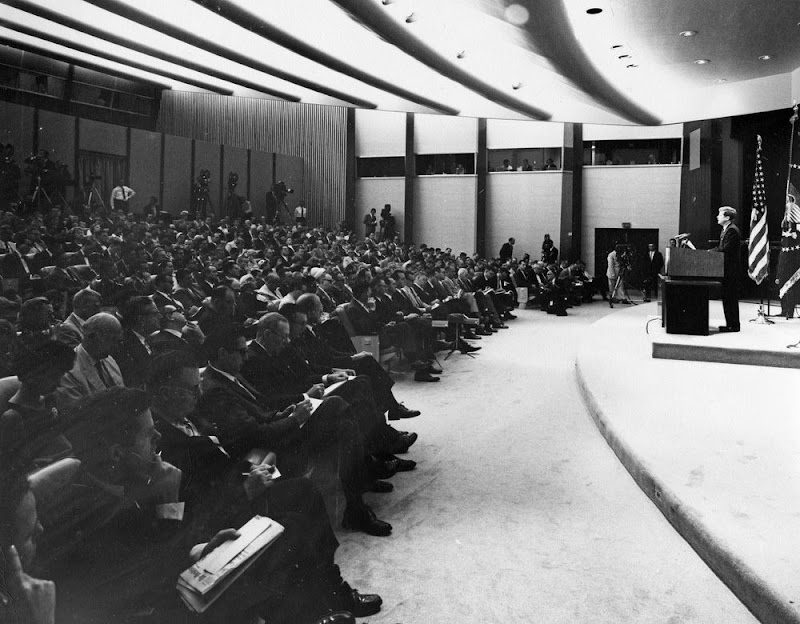
News conferences are a double oxymoron. Pressers aren’t conferences; conferences involve back-and-forth communication. Nor do they have anything to do with news. News is neither created nor conveyed at a press conference.
The one place in the world where news is least likely to happen is a press conference. If I were in charge of a media organization the last thing I’d spend money on would be a White House correspondent whose role is to sit politely holding up his or her hand, hoping like a compliant schoolchild to be called upon, begging for the privilege of being lied to.
Though there was that time an Iraqi journalist tried to bean George W. Bush with his shoe. Muntadhar al-Zaidi. He’s a journalist. And that was a news-making press conference.
Whatever CNN paid Jim Acosta to transcribe Donald Trump’s BS was too much. Even so, we owe Acosta for pushing the president so far that he yanked his reporter’s press pass in a fit of pique. With a brusque instruction to his despicable minister of propaganda Sarah Huckabee Sanders, Trump simultaneously exposed his authoritarian personality so that none could deny it. Even Fox News was alarmed, joining CNN’s (probably doomed) lawsuit against the president. “Secret Service passes for working White House journalists should never be weaponized,” quoth Fox’s Chris Wallace.
Trump threatened to revoke more White House press passes should his journalistic stenographers displease him.
The Acosta affair has convinced me of something I’ve been mulling for a long time: the president of the United States should be required to hold an hour-long daily press conference. Unless there’s a national emergency like 9/11. Then he can skip a day.
Why, if press conferences are total BS—and they are—should the president have to do them? Because this a democracy. Trump is not a king.
Roman emperors and generals rode through their triumphs next to a slave who whispered “remember you are mortal” in their ears lest their success convince them they were gods. Presidents should be required to host press confabs so they remember that they are not the people’s boss. Presidents are our servants. They are our slaves. They are accountable to we, the people or, the next best thing in this case, the people’s scribes. Presidents owe us answers.
The death of press conferences reflects the dedemocratization of America’s politics and the rise of an imperial attitude that belies the country’s moral and economic decline. During Donald Trump’s first year in office he held just one old-fashioned solo press conference.
The trend has not been a straight line but the overall track is unmistakable. Obama held seven during his first year, Bush 43 had four, Clinton 11, H.W. Bush 27, Reagan six, Carter 22.
JFK held an average of 23 press conferences a year. Track them down on YouTube; the witty banter and jovial self-confidence is a sad reminder of what we’ve lost.
Trump is not a king, American presidents are not kings, but even that comparison of accessibility is unfair—to hereditary monarchs. In many societies kings and queens were expected to clear their schedules for royal audiences where subjects could lodge petitions and plead grievances. These events are depicted in the alt-medieval fantasy series “Game of Thrones.” In India medieval kings, and then Mughal emperors appeared at their balcony for the Jharokha Darshan, a daily audience where the public griped, groused and begged for royal indulgence.
There will be those who argue that the president is too busy to meet the press. Fortunately, there is ample proof that Donald Trump, like Barack Obama and George W. Bush before him, have more than free time to make themselves available. He, like most former presidents, play the hours-long, fake sport of golf.
(Ted Rall (Twitter: @tedrall), the political cartoonist, columnist and graphic novelist, is the author of “Francis: The People’s Pope.” You can support Ted’s hard-hitting political cartoons and columns and see his work first by sponsoring his work on Patreon.)

